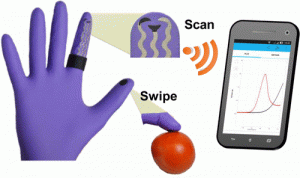Pesticides, extremely effective at killing pests, can also unfortunately pass on the same harmful effects to the people who use them—most commonly farmers. To combat the problem, researchers have developed a way to detect the presence of such compounds in the field using a disposable “lab-on-a-glove,” according to Phys.
Because different types of pesticides consist of different levels of toxicity, the protective glove is of particular importance, as it can be used to determine which compounds are present more accurately and quickly.
The new wearable, flexible glove biosensor carries out the sampling and electrochemical biosensing steps on different fingers. Detection of the collected residues is performed when the thumb touches the printed enzyme-based organophosphate biosensor on the glove index finger.
The electrochemical analysis is determined when the wearer swipes their thumb on a surface for testing and then proceeds to touch their thumb and index fingers together. The real-time results are then displayed on the user’s mobile device.
Researchers say the sensor could also be used in both security and food safety settings as well.
Read the full article and complete paper here.
Sensors have also found their way into a number of other fields: detecting muscle fatigue in sweat, warning users of incoming heart attacks and strokes, monitoring blood alcohol levels with temporary tattoos, and detecting foodborne illness like Salmonella within minutes. With new research and breakthroughs regularly developing, advancements in sensors continue to expand the possibilities.



